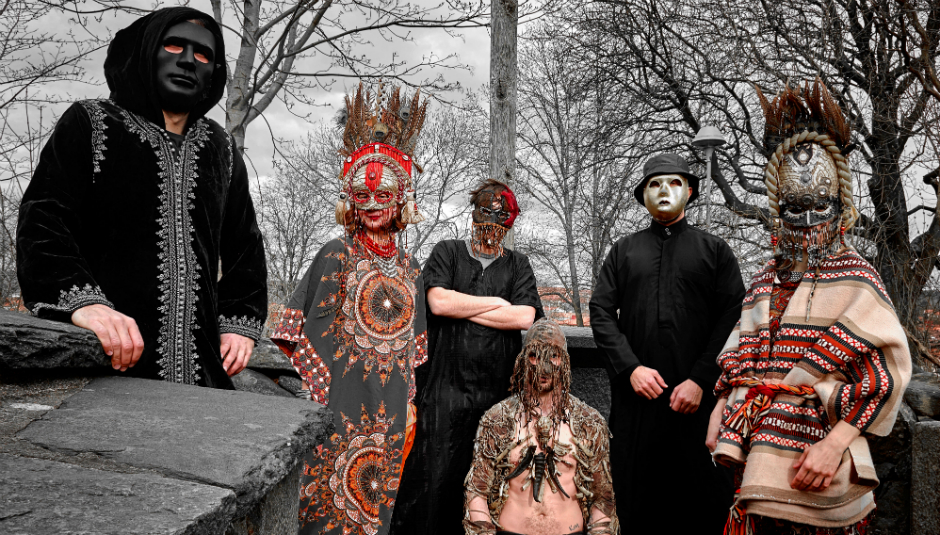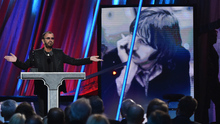When my phone gets buzzed by one of GOAT’s members (they’ve never revealed their actual identities, understandably enjoying the privacy of anonymity), I apologise for the lateness of the call. Before I can begin my homogenous line of questioning he coolly dismisses my concerns and asks if I know it’s still sunny at 11pm during a Swedish Summer. I confessed I did not. “The sun is up, I’m right now by the sea, and it’s quite beautiful.” Initially disarming, his digressions about nature and musical niches – at one stage he leaves his phone to scramble through his most recently played artists to tell me about “this cool African band from the 70s and 80s” – become compelling and fascinating. The impression I’d inferred from previous interviews signalled this mysterious, unchatty figure, but the reality couldn’t be further from the truth. GOAT – which I’ll designate my interviewee for the sake of syntactic flow/convenience – was funny, laid back, and infectiously passionate about music.
He reminded me of strangers you become festival friends with, warm-hearted music obsessives you fondly remember losing their shit to an obscure R&B 7” during the silent disco. In the most old-school sense, GOAT care about the music; its joy, its imprints, its purity, and its independence from politics and projected narratives.
Politics and projected narratives matter; at least I thought they did. Since they exploded into the zeitgeist in 2012 with their eclectic debut World Music, they’ve been assigned reductive labels that have stuck for five years, from their alleged status as psychedelic revivalists, to their standing as a ‘live band’, to their notoriously enigmatic origin.
That enigmatic mythology which underpins GOAT – that they hail from an isolated Swedish village with a deep tradition of folk music and even voodoo – is something they consciously and playfully repurpose, which I’ve always assumed was because, to them, backstory isn’t as much fun as music. When I ask whether the industry and press hold too much investment in a band’s backstory or image, he answers “different things matter to different people. If you’re interested in the image or story of our band then that’s okay, and it’s okay if you’re more into our music. When we put our music out there, we don’t own it anymore, the listeners own it and can do with it what they want. It’s transcendent of us as the creators, and that’s really cool.”
Alongside their mythos, over the past five years, GOAT have developed a reputation as a ‘festival’ or ‘live’ band, due to their wonderful costumes and theatrical stage antics – not to mention the dazzling aptitude of their technical musicianship – which again my interviewee played down without refuting. “Everything we do live we do because it’s fun, all the costumes and games. Live music is spontaneous and exciting, we can do anything that isn’t on the recording, so we like to go places we don’t normally go and do things we don’t normally do.” He maintains “we’re happy playing music wherever…we do what we think is fun.”
When I ask about their affiliation with the psychedelic revival, he’s again irreverent. “We don’t like the label, and we don’t like to think of our music like that [in genres], but if it helps some people then that’s good.” Their last album, 2016’s Requiem, saw them divulge into weirder, yet more coherent tracks of up to eight minutes, and I was curious whether these represented the next direction of the band. “Those songs were what we wanted to do then. I don’t know what we’ll be doing next time. Music is instinctive, so we’ll see what we’re feeling.”
But what of the future in general? “We don’t have any plans at the moment. We may record something in the future but just now we’re doing our own things and that’s really cool,” he said. “We’re really enjoying what we’re doing right now, playing live for all these people is the best thing in the world. But nothing lasts forever, we know this, so we’re enjoying it while we can and not overthinking about what happens later. Music is spontaneous after all, so who knows?”
Besides the O2 Academy Brixton this Saturday, the only other gig they have officially scheduled is at WOMAD (World of Music, Arts & Dance) Festival this weekend. They’re “exceptionally excited” about playing alongside the likes of Toots & The Maytals (“a great band”) and value the merit of these festivals in promoting the tolerance and cosmopolitanism of world music. “It’s a great idea for a festival, and though we haven’t played there before, we’re very excited. There’s so much great music everywhere; as you guys [the press] have said, we have lots of influences from all over the place. Right now I’m listening to this interesting African band at the moment, it’s sort of punky and fun. What are you listening to?”
The interview is cyclical, always returning to the Big Question of what cool music we’re currently both into. Half-jokingly, I ask him whether we’ll ever see a black metal GOAT album, having read that GOAT listen to that scene. Half-jokingly, he coyly suggests “maybe one day”, before asking me for my favourite black metal record. I awkwardly splutter, attempting to admit my density around the subject, which he mistakes as impossible indecision and instead asks me for my “three favourite black metal records”. When I finally confess my ignorance, he promises to recommend some great Scandinavian black metal to me in future, before asking me for my “three favourite hardcore records as a compromise”.
We the press care about stuff – identities, reputations, defined musical aesthetics – that GOAT aren’t really bothered about. In an industry where being "all about the music” has been a cliché since the mid-60s, it’s practically disingenuous to describe them as being anything else.
GOAT are playing the O2 Academy Brixton on Saturday 29 July, supported by The Moonlandingz and Jane Weaver. Tickets for the show can be purchased here.























